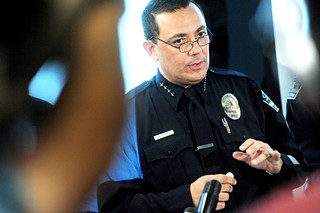Report: APD Understaffed
Over the next five years, department would need 257 more hires to keep pace with population growth
By Jordan Smith, Fri., July 13, 2012
The Austin Police Department is busy. So busy, in fact, that its patrol officers – who now number 559 – spend the majority of their time running from call to call. That makes it difficult, at best, for officers to engage with the community or in problem-oriented policing strategies. In order to relieve that call-to-call burden, the city would need to authorize an additional 90 patrol officers, and create 10 new sergeant positions to maintain appropriate supervision.
That's the conclusion of the Police Executive Research Forum, which the city hired to study the department and its resources, in order to make recommendations for an "innovative, sustainable method to determine current and future police department staffing needs," according to the 130-page report delivered to city officials last week. Austin's police chief says he's unsurprised by the findings, while the City Council member whose questioning prompted the study calls the report a "good discussion starter," but says it may have compared "apples and mangos" to reach its conclusions.
According to the study, officers spend an average of 57% of their work time simply responding to calls for service. That time would have to be reduced to about 45% if those same frontline officers are going to engage more directly with the neighbors they serve, and be involved in problem-oriented policing across the city. (Indeed, just under 17% of Austin residents surveyed in the study said they were familiar with the officers working in their neighborhoods.) In order to allow officers to engage more directly, the city would need to hire an additional 90 patrol officers and fill 57 current vacancies, according to the report. To keep up with population growth, the report suggests that the city also hire an additional 78 detectives and 24 sergeants.
The PERF study was prompted by last year's budget discussions during which Council Member Bill Spelman suggested that staffing at APD should be based on what the department needs and wants to achieve, and not by an officers-to-population formula, where the benchmark has been set to reflect a standard of at least two officers per every 1,000 persons. Under that basic formula, council last year hired an additional 49 officers to keep pace with the city's growing population. According to PERF, keeping up with the 2:1,000 standard would require the department to increase by an additional 257 by 2017 – in other words, 404 hires in the next five years.
The results of the study do not surprise APD Chief Art Acevedo. "The patrol guys are humping it from call to call," he said. "That's what this speaks to: We can't do problem-oriented policing because we just don't have the resources."
Still, the report does make clear that the total number of sworn personnel needed could be reduced by at least 29 if the department would allow certain positions to be staffed by civilian personnel – a possibility also raised by Spelman during last year's budget talks. The PERF report identifies possible positions that could be converted to civilian staff within several APD units, including some in its risk management division, training division, and in the Real Time Crime Center. Acevedo says he is absolutely open to making those kinds of changes. "We're always open to that," he said.
Spelman says the report is a "good discussion starter, but is not the end of the discussion." He notes that the report's calculation of officer call-for-service time includes officer- or supervisor-initiated activities, like traffic stops and directed patrols, which may be valuable activities, but are not the same as answering 911 calls. In other words, he says he believes the report compares "apples and mangos" to reach the conclusion that additional officers are needed to decrease time spent going from call to call and to increase time for community policing activities. Instead, he said, a discussion is in order about how effective those various additional duties are, and whether some could be handled more efficiently, which would create more free time to address problem-oriented policing strategies. "This should open up a whole field of discussions we've never had before," he said.
Read the full PERF report.
Got something to say on the subject? Send a letter to the editor.











